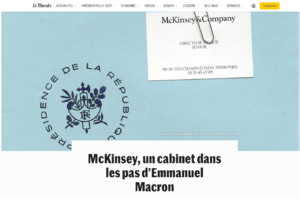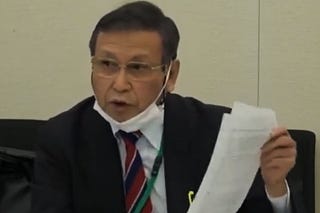
Flashback: By 2022, the Macron government spent $2.4 Billion euros on consulting firms
In the UK, Consultants’ fees were estimated at £6,250 a day
Etienne Note: This article also appears in “Government”, Media and Academia Criminality Exposed, A digest of HUNDREDS and HUNDREDS of articles exposing and suggesting inter-generational organized crime's control of the "Government," Media and Academia by the Art of Liberty Foundation. You can view the other articles or subscribe on Telegram: https://t.me/Government_Scams
Check out our monograph: Solving Covid - The Covid 19 Eugenics, Vaccine/Drug Scam Timeline at and its companion article: The Covid 19 Suspects and Their Ties to Eugenics and Population Control/Reduction to understand who is behind "The Covid"
This article is almost 3 years old but has not received attention in the US. It is important, as we come to grasp how the COVID sausage was made.
For example,
Enter McKinsey, who was drafted in to intervene by sorting out all the logistics, organization and monitoring of France’s national vaccination campaign, spanning from November 2020 to February 4, 2022. The new ‘McKinsey cabinets’ were seen to have lent a hand to the State on the key aspects of the crisis, and they are still in charge today.
and this quid pro quo:
French media outlet Le Monde, published a explosive article where we learn how Macron’s campaign program was written “for free” by 20 McKinsey employees.
and this:
We are now seeing a vivid and highly disturbing picture emerge with McKinseyGate: under the auspices of the innocuous-sounding ‘Private Public Partnership,’ we can now the formation of a shadow government in France – a veritable foreign corporate fifth column firmly installed inside the French government structure.
Please go to this link to see all the graphics. My copy is missing many of them.
McKinseyGate: France’s Shadow Government and the Rise of the Corporate State
MARCH 31, 2022 BY LFC NEWS 16 COMMENTS
Freddie Ponton
21st Century Wire
In France, consultancy firms have been paid billions of euros to advise governments on policies from the coronavirus vaccine, to climate change, and vaccine roll-out, as well as digital transformation, according to a new report released by the French Senate. While the financial sums are staggering, the real scandal is the level of influence on policy that these shadowy corporate actors wield deep inside the halls of government.
The revelations contained in this report are extraordinary, and expose the inner workings of the highest echelons of the French state, in what can only be described as the near-complete corporate capture of the bureaucracy.
The findings of the Senate report have since been adopted unanimously by committee members on March 16, and will be translated into a legislative proposal, and a trans-partisan bill which has already been announced.
What has been revealed is breathtaking, and opens the door to what could be one of the most consequential scandals in decades.
Summary report of French Senate Commission Inquiry into the Growing Influence of Private Consulting Firms on Public Policy:
This article will not only examine the corporate takeover of whole governmental departments, but it will also look at the risk-benefit analysis of government in its liberal use of consultancy services, and outline the danger that lies with such Public Private Partnerships. It will also provide concrete evidence of consultancy firms’ deep and problematic business ties with the Executive Branch of the French Government.
It is important to examine how these powerful consultancy firms underpin a much larger transnational network. This raises a number of important questions: what is the likelihood of conflict of interest taking place, and do they represent a danger to countries’ national security? Are elected officials and civil servants taking a back seat to non-elected private individuals and their companies who are being allowed to steer public policy in favor of a much broader transnational corporate agenda?
After a four-month parliamentary inquiry looking into lucrative contracts granted to consultancy firms like Accenture, Bain & Company, Boston Consulting Group (BCG), Cap Gemini, Deloitte, Eurogroup, EY, McKinsey & Company, PwC, Roland Berger, and Wavestone, the French Senate Commission has released its findings – and the outcome is rather damming. The inquiry was lead by senators and the French government opposition bench.
The use of consultancy firms by the French administration has more than doubled since the beginning of Macron’s five-year presidential mandate. According to the Senate commission report, a noticeable 45% increase in 2021 has been identified, some of which can be attributed to the Covid-19 pandemic.
Many serious questions and findings have emerged from the Senate committee inquiry report, including the likelihood that Karim Tadjeddine, an Associate Director at McKinsey & Company, may have perjured himself during a Senate hearing when according to Senator Éliane Assassi he claimed under oath that McKinsey was paying taxes in France.
Despite McKinsey being awarded many contracts in France, the commission investigation into this matter, with the help of the government budget department, will reveal that McKinsey has not paid any taxes in France for at least 10 years. How can this be?
In a press conference, Eliane Assasi described the government use of these consultancy firms as a “reflex” and outlined how these companies are embedded at the highest level within the government, and integrally involved in most of the major government reform projects, including the pension reform scheme, the housing benefits reform, and several key aspects of the government’s economic recovery plan.
The conclusion of the 350-page report is very alarming. Naturally, the people of France want answers.
The Public-Private Revolving Door
Following the 2007 election of President Nicolas Sarkozy, the use of consultancy companies became a phenomenon with firms like McKinsey, Deloitte, Cap Gemini, BCG, and Accenture securing deals worth about €250 million during his tenure. Firms sought to create a growth market with government growth drivers, in order to compensate for the slump in the business sector.
Unprecedented levels of payments to firms like McKinsey are part of a much broader budget which was allocated by the French government to hire consultancy firms to assist in the design and implementation (including operational) of public policy projects in support of the DITP (inter ministerial directorate for public transformation) and the inter ministerial digital directorate (DINUM), and the modernization of all their departments.
More alarming is the fact that such companies were hired to work directly on legislative reforms. While these firms may claim that their quest to secure lucrative government contracts is not motivated by financial gain, but rather as an investment in a Public Private Partnership, the reality is that this is a form of lobbying which ensures that numerous high-level government officials are well looked after as they eventually return to the corporate world for a few years holding top position in French CAC top 40 companies, before returning to the political scene. This ‘revolving door’ between government and the consultancy industry is where the real money is made for consultancy firms and their directors. In reality, only 5% of McKinsey revenues are generated in the public sector, the rest is secured with large corporate accounts. However, the back and forth between the public and private sector is so well established that the French have given it a name: “Pantouflage.”
The so-called “Pantouflage” has increasingly been at the centre of many scandals in France; government officials’ constant incestuous back-and-forth between the corporate world and government has gradually eroded away at the foundations of democracy, allowing all forms of conflicts of interest to take place. Of course, we can accept the fact that politicians do have, at some stage, to go back to work in the private sector – which is not a crime in itself, but returning to the political stage afterwards shouldn’t even be an option.
“Pantouflage” is where a senior civil servant leaves their post with the state and joins a private company, an example of institutional elite corruption.
Within the context of the COVID-19 pandemic, we can see governments around the world resorting to a reliance on high-powered consultancy firms to formulate and implement vaccination strategies, the controversial roll-out program, and its associated procurement and logistics.
Macron government spent 2.4 billion euros on consulting firms
In the United States, McKinsey secured $19.3 million worth of contracts which turned out to be a mere down payment, as 10 days later the US Defence Health Agency added more funding – bringing the VA Contract’s value to an excruciating $22.5 million, and all this in just the first months of the pandemic, according to investigative site ProPublica.
As for the United Kingdom, the bills of the Boston Consulting Group aka BCG, were amounting to £10 million – for 40 people to work on the government’s Covid testing program. Consultants’ fees were estimated at £6,250 a day over the course of four months, according to a report in the Guardian.
It’s important to note here the hundreds of millions of euros which privileged corporate suppliers netted from these unprecedented testing, track and trace apps, PPE, and vaccination programs – with foreign consultancy firms embedded at the very center of the government process for the selection and awarding of these super contracts.
Among the German market’s top performers are Boston Consulting Group and Bain & Company who posted their best years ever during the pandemic. €550 billion was allocated to protect the economy from the effects of the novel coronavirus in Germany according to DEVEX Interactive dashboard which keeps track of where such funding is going, who is supplying the money, and the strategic focus for the funding.
As reported by Consultancy.eu in March 2020, a strong growth in Europe’s largest consulting markets had lifted the continent’s consulting industry to a record high turnover of $45 billion during this period, with European consultancy powerhouses France and Germany leading the way.
During the ‘public health’ crisis, the call for employing more consulting firms was not only limited to the first wave of the Covid pandemic, a period when the State was seen to be unprepared, and when Europe appeared to be surprised by the scale of the alleged contagion. However, the use of private consultants continued throughout the duration of the crisis. Enter McKinsey, who was drafted in to intervene by sorting out all the logistical organization and monitoring of France’s national vaccination campaign, spanning from November 2020 to February 4, 2022. The new ‘McKinsey cabinets’ were seen to have lent a hand to the State on the key aspects of the crisis, and they are still in charge today.
The Senate reports also indicate that Accenture intervened to direct the implementation of information systems such as the vaccination passport or a French ‘pass sanitaire’ (which is a version of the new EU Digital Covid Certificate), whilst consultants Citywell advised the State on the supply and management of PPE equipment like masks, from March to October 2020.
According to a report filed by Mediapart (independent French online investigative journal) Accenture has been selected to make €800 million euros in savings on state services, for a mission whose amount is estimated at €25 million euros, according to the investigation. Not surprisingly, McKinsey managed to obtain the second part of that market whose mission was meant to achieve savings across 484 public institutions for a minimum amount of savings estimated by Bercy at €200 million euros. The Senate report discloses some 68 orders placed by the State with various consultancy firms, for a total amount of €41.05 million Euros in fees. According to the senators, based on the billing practice of five consultancy firms, they were able to determine that individual consultants were billing the French government an estimated €2,168 per day.
In 2021, more than €1 billion euros minimum in consulting expenditures for ministries and public operators was recorded (bearing in mind the Senate Inquiry investigated only 10% of the French public operators). The question remains: where did this money go, and what do we have to show for it? What was the noticeable impact on all of these supposed government cost reduction strategies?
Consider the following: whilst the United States is asking McKinsey to pay a compensation of $573 million to settle a dispute over their involvement in the disastrous opiates scandal, the French government is hiring McKinsey to run its national vaccine roll-out.
It is only fair for us to question the reasons why such an astounding amount of taxpayers money has been allocated to these well-connected firms, and McKinsey in particular (taking in roughly €250,000 euros per working week, €50,000 euros per day) to do a job our Ministry of Health is more than well-equipped to undertake. Is the French state now ConsultoDependent?
The problems do not end there. Several elected officials suspect serious conflicts of interest and close ties between certain consultancy firms and members of the government, including President Emmanuel Macronhimself, who is suspected of such ties.
Indeed, there were links during the presidential campaign between Macron and McKinsey – as evidenced in a report from French media outlet LeMonde, which published an explosive article where we learn how Macron’s campaign program was written “for free” by 20 McKinsey employees.
Eliane Assassi (rapporteur) and Arnaud Bazin (President) of the Senate Commission inquiry reminded every one of their conclusion, that the purpose of their inquiry was not to question the use of private consulting firms, but to first assess its relevance, and to document any interference by private consulting firms into the formation of public policies. Their goal is to put an end to the opacity that surround the relationship between consultancy firms and our government.
Breakdown of consulting expenses during the health crisis
(excluding Public Health France and in millions of Euros)
Source. Senate Report
What was McKinsey’s role in France’s vaccination strategy?
Logistics Organization – Study of logistics scenarios for the distribution of vaccines, monitoring of deliveries, stocks, injections and appointments
Indicators & Monitoring Tools – Daily production of performance management indicators of vaccine campaign, follow-up of a register of around 250 key actions and decisions
Sector Analysis Requested by the Ministry of Health – Action plan for the 3rd dose recall campaign, update on the overseas territories in the summer of 2021
Project Management – Preparation of meetings, support for the restructuring of the “vaccines” task force
The Senate conclude their report by accusing the French subsidiaries of the US-based McKinsey & Company of tax avoidance, and the complaint has now been forwarded to the public prosecutor.
McKinsey’s French turnover reached €329 million euros in 2020, of which around 5% is in the public sector, and it employs around 600 employees based in the country, and yet for more than 10 years they have never paid corporate taxes in France.
French Heath Minister Olivier Véran was interviewed in February 2022 by the Senate committee on the overuse and potential influence of consultancy firms such as McKinsey – who appear to control the key decision-making mechanisms relating to France’s vaccination strategy (and other French strategic areas).
Who is McKinsey in France?
The company, nicknamed “The Firm,” apparently doesn’t like the spotlight, yet it is located on the Champs above a shopping mall, with a breathtaking view of Paris. It has long been regarded as a company that cultivates secrecy over its 100-year history following its founding in the United States. As a World Economic Forum (WEF) partner, McKinsey is a consulting firm for CAC40 French stock market bosses, heads of state, and government ministers.
On its website, the company says it is “committed to the decisive transformations of its customers” and “Improving the World.” Digital transformation is the path Macron’s government took from 2017 onward, which appears to be streamlined with the WEF agenda known as the “Great Reset,” and whose coffee table publication can be found on many world leaders’ presidential desk. It only stands to reason then that Macron’s grooming as a WEF Young Leader in Davos, Switzerland will have some influence on the direction which such sweeping government initiatives are taken.
Go paid at the $5 a month level, and we will send you both the PDF and e-Pub versions of “Government” - The Biggest Scam in History… Exposed! and a coupon code for 10% off anything in the Government-Scam.com/Store.
Go paid at the $50 a year level, and we will send you a free paperback edition of Etienne’s book “Government” - The Biggest Scam in History… Exposed! OR a 64GB Liberator flash drive if you live in the US. If you are international, we will give you a $10 credit towards shipping if you agree to pay the remainder.
Support us at the $250 Founding Member Level and get a signed high-resolution hardcover of “Government” + Liberator flash drive + Larken Rose’s The Most Dangerous Superstition + Art of Liberty Foundation Stickers delivered anywhere in the world. Our only option for signed copies besides catching Etienne @ an event.


















- DON’T BELIEVE..?? GO BACK & READ/WATCH OLD INTERNATIONAL “MAFIA MOVIES” .. WHICH WERE ORIGINALLY
DOCUMENTARIES…!!
••••••••••••••••••••••••••••••
—- WHICH ARE MOST LIKELY S T I L L T R U E …
! ! ! — PEOPLE WERE KILLED FOR MAKING THOSE “ MOVIES ” •••••